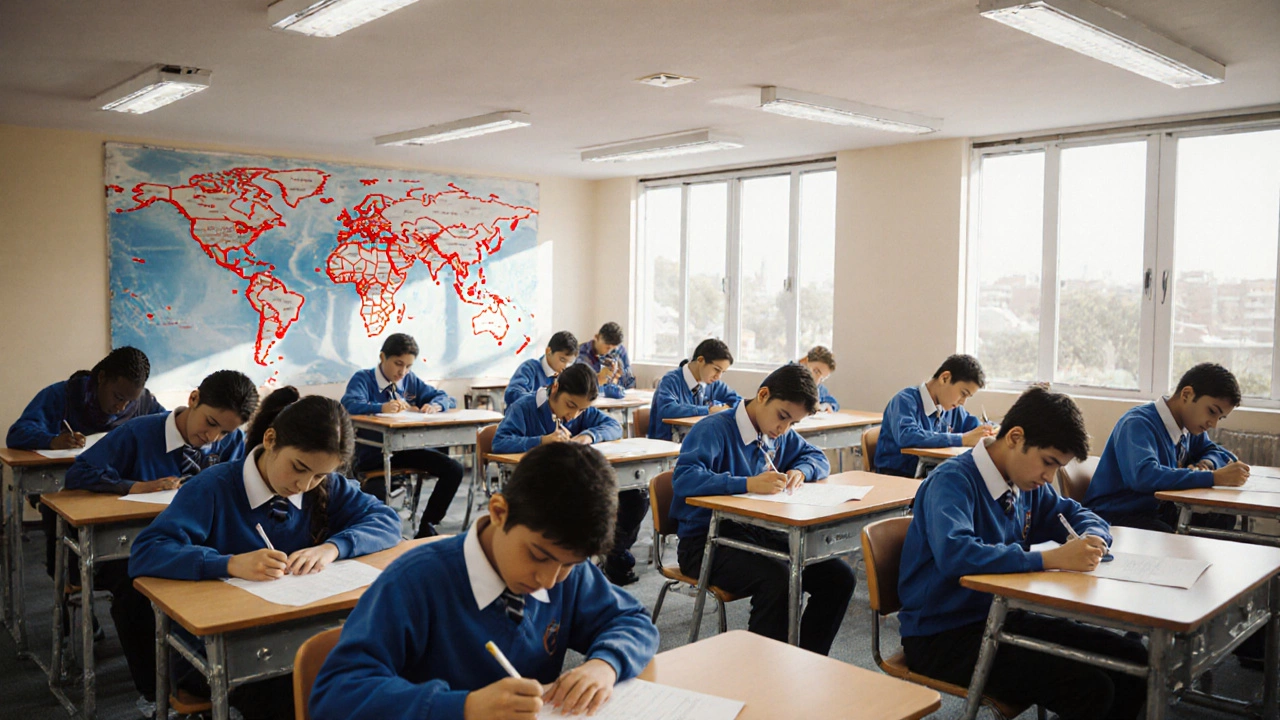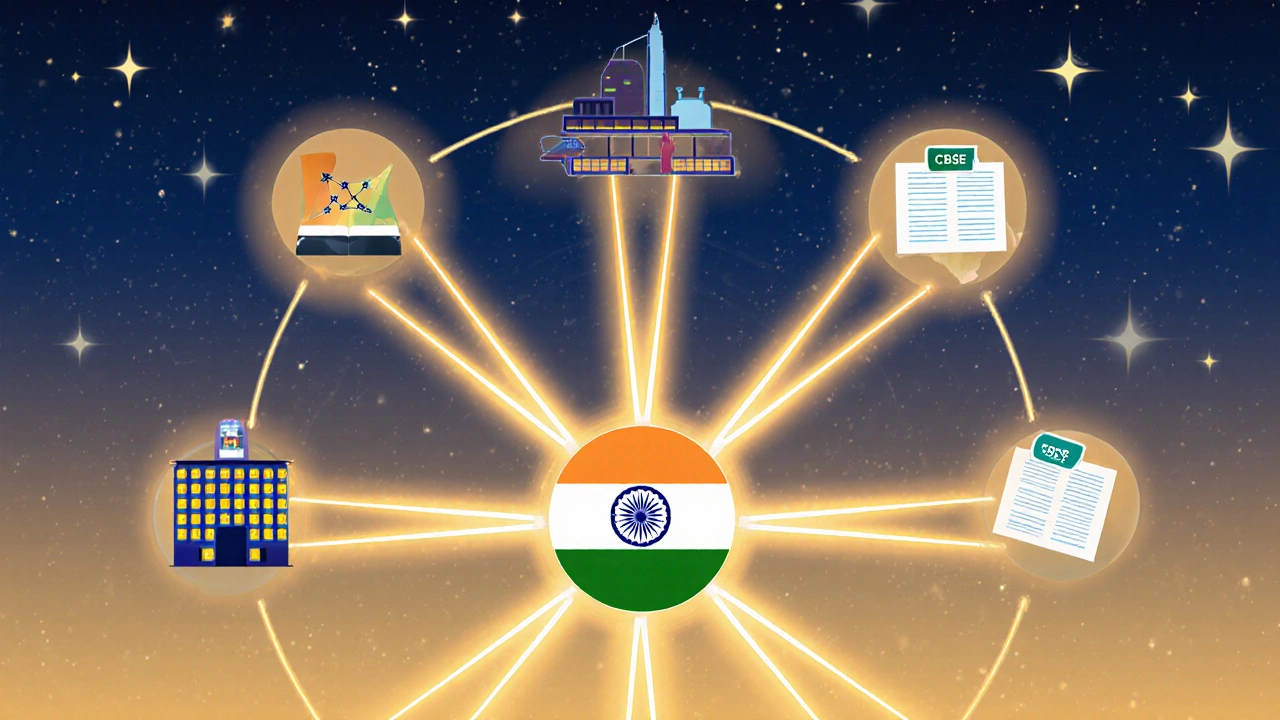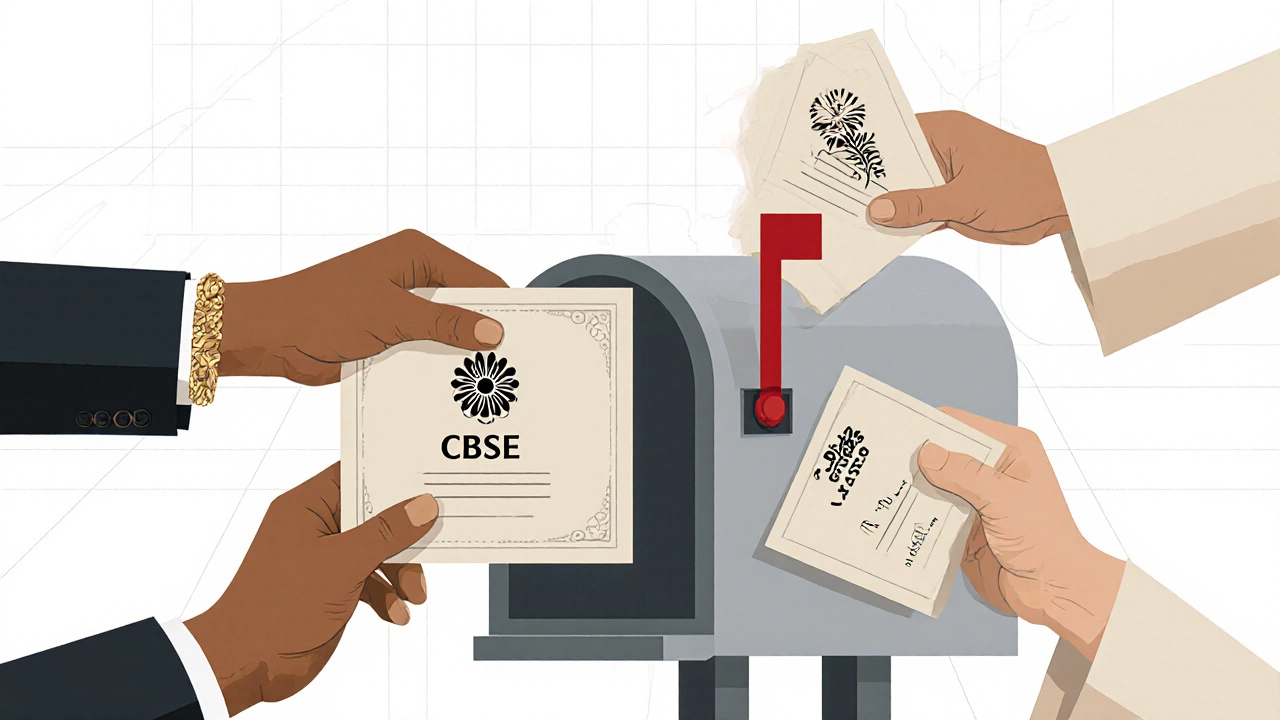Is CBSE Outside India? Here’s Where It’s Actually Offered

CBSE Schools Abroad Locator
Find CBSE Schools in Your Country
CBSE-affiliated schools operate in over 25 countries worldwide. Only schools listed on cbse.gov.in are officially recognized and offer valid board exams.
Select a country to view CBSE school information
Many parents and students wonder if the Central Board of Secondary Education (CBSE) curriculum exists beyond India’s borders. The answer isn’t a simple yes or no-it’s more like, CBSE isn’t just in India, but it’s also running in over 25 countries through officially recognized schools. These aren’t just Indian expat communities clinging to home-they’re fully accredited institutions offering the same syllabus, exams, and recognition as schools in Delhi or Mumbai.
What Exactly Is CBSE Outside India?
CBSE is India’s national education board, responsible for designing curricula for classes 1 through 12, conducting the Class 10 and Class 12 board exams, and setting standards for science, math, and social studies. Outside India, CBSE doesn’t operate directly. Instead, it authorizes and monitors schools that follow its syllabus under the CBSE Affiliation Scheme for Schools Abroad. These schools are called Indian Curriculum Schools Overseas or CBSE-affiliated international schools.
Think of it like this: CBSE is the rulebook. Schools abroad are the teams playing by those rules. They use CBSE textbooks, follow the same exam pattern, and students sit for the same board exams-sometimes even in the same test centers abroad. A student in Dubai taking the CBSE Class 10 exam is answering the same paper as a student in Jaipur.
Where Can You Find CBSE Schools Outside India?
CBSE-affiliated schools are concentrated in countries with large Indian diasporas, but they’re spreading fast. The most common locations include:
- United Arab Emirates-Dubai and Abu Dhabi alone host over 60 CBSE schools, making it the top country outside India for CBSE education.
- Saudi Arabia-Riyadh, Jeddah, and Dammam have dozens of schools following CBSE, especially in expat-heavy neighborhoods.
- Qatar, Oman, and Kuwait-All have growing networks of CBSE schools catering to Indian professionals working in energy and infrastructure.
- United States-Cities like Houston, New Jersey, and Chicago have CBSE schools, often run by Indian community trusts.
- United Kingdom-London, Birmingham, and Manchester host around 15 CBSE schools, mostly serving families returning from the Gulf or those preferring Indian curriculum over GCSEs.
- Australia-Sydney and Melbourne each have 3-4 CBSE schools. Many are newer, opened in the last five years as Indian migration increased.
- Canada-Toronto and Vancouver have a handful, mostly in areas with high South Asian populations.
- South Africa, Kenya, and Nigeria-These countries have smaller but active CBSE networks, often linked to Indian business communities.
According to CBSE’s 2024 annual report, there are 278 affiliated schools outside India-a 42% increase since 2020. That’s not just growth; it’s a shift in how global Indian families approach education.
Why Do Families Choose CBSE Abroad?
It’s not just nostalgia. Families choose CBSE overseas for very practical reasons:
- Seamless transition-If a family moves back to India, their child doesn’t need to relearn a new syllabus. The CBSE curriculum is consistent everywhere.
- University recognition-CBSE Class 12 results are accepted by top universities in India, the UK, Canada, Australia, and the US. Many universities even have direct admission pathways for CBSE students.
- Focus on STEM-CBSE’s strong emphasis on math and science prepares students for engineering, medicine, and tech careers, which is why so many Indian families prioritize it.
- Language advantage-English is the medium of instruction, and students gain fluency while still learning core subjects in a familiar structure.
- Exam predictability-Unlike systems with constant curriculum changes, CBSE has a stable pattern. Past papers are widely available, making exam prep easier.
One mother in Sydney told me her son switched from an Australian public school to a CBSE school in Melbourne because he was falling behind in math. Within six months, he was top of his class. “He wasn’t behind-he was just in the wrong system,” she said.

How Is CBSE Different from Other International Curricula?
CBSE isn’t the same as IB, Cambridge (IGCSE), or the American curriculum. Here’s how it stacks up:
| Feature | CBSE | IB (Diploma) | Cambridge (IGCSE/A-Level) | American (AP/High School) |
|---|---|---|---|---|
| Structure | Centralized, standardized across India and abroad | Global, inquiry-based, holistic | Subject-based, modular | Flexible, state-regulated |
| Core Focus | Math, Science, English | Interdisciplinary, critical thinking | Subject mastery, exam-driven | Electives, extracurriculars |
| Assessment | Board exams at Class 10 and 12 | Internal assessments + final exams | IGCSE at 16, A-Level at 18 | Final exams + GPA |
| Recognition in India | Widely accepted | Accepted, but requires conversion | Accepted, but often needs additional exams | Accepted, but less common |
| Cost | Lower than IB or Cambridge | Very high | High | Moderate to high |
IB schools cost upwards of $20,000 per year. CBSE schools abroad typically charge between $4,000 and $10,000. That’s a big difference for families on a budget.
Is the CBSE Certificate Valid Abroad?
Yes. CBSE Class 12 certificates are recognized by universities worldwide. The UK’s UCAS system, Canada’s provincial universities, Australian TAFE and universities, and U.S. colleges all accept CBSE results. Some universities even publish minimum score requirements for CBSE applicants.
For example:
- University of Toronto requires a minimum of 80% in five subjects for CBSE students.
- University of Melbourne accepts CBSE with a minimum of 75% in relevant subjects.
- Many U.S. colleges use CBSE scores alongside SAT/ACT scores for admissions.
CBSE also works with World Education Services (WES) and other credential evaluators to help students convert their grades for international applications. You don’t need to retake exams or get extra certifications-just submit your marksheet and certificate.
What About Language and Culture?
Some parents worry their kids will lose touch with local culture. But CBSE schools abroad aren’t isolated bubbles. Most integrate local history, geography, and social studies into their curriculum. Students celebrate Diwali, but also learn about Australia Day, Thanksgiving, or Eid depending on location.
Language is another concern. CBSE teaches English as the primary medium, but many schools offer Hindi as a second language and sometimes even local languages like Arabic, French, or Mandarin. Students often become trilingual-English, Hindi, and the local language.

How to Find a CBSE School Outside India
If you’re looking for one, here’s how:
- Go to the official CBSE website (cbse.gov.in).
- Click on “Affiliated Schools” and select “Schools Abroad” from the dropdown.
- Use the filter to select your country.
- Check the school’s accreditation status-only schools listed here are officially recognized.
- Visit the school website and confirm they conduct CBSE board exams locally.
Don’t trust private listings on Google or Facebook. Some schools claim to be “CBSE-style” but aren’t affiliated. Only the official list matters for exam validity and university recognition.
What Happens If You Move Countries?
If your family relocates again, your child can transfer to another CBSE school anywhere in the world. Their academic records, including internal assessments and term marks, are transferred through the CBSE network. Even if they’re moving from Dubai to Sydney, the transition is smooth because the curriculum and grading system are identical.
Many CBSE schools abroad also offer online support for students who need to catch up or prepare for board exams remotely. Some even have shared exam centers across regions so students don’t have to travel back to India.
Final Thoughts
CBSE isn’t just an Indian thing anymore. It’s a global education option-reliable, affordable, and respected. Whether you’re living in London, Toronto, or Sydney, you can give your child the same education as a student in Bangalore. The board has adapted to the needs of a mobile generation, and schools abroad have stepped up to deliver it.
If you’re considering international education but want to keep your child on a path that leads straight to Indian universities-or to global ones that accept CBSE-this is one of the smartest choices out there. It’s not about staying connected to home. It’s about giving your child a system that works, no matter where they are.
Is CBSE recognized in the USA?
Yes, CBSE Class 12 results are accepted by most U.S. universities. Students often submit their scores along with SAT or ACT results. Many universities have specific guidelines for CBSE applicants, and some even offer scholarships based on CBSE performance.
Can CBSE students apply to IITs and NITs from abroad?
Absolutely. CBSE students living overseas can register for JEE Main and JEE Advanced just like students in India. They need to apply through the official NTA portal and may need to travel to India or an approved international test center for the exam. CBSE affiliation ensures their eligibility.
Are CBSE schools abroad more expensive than local schools?
Usually, yes-but not always. CBSE schools abroad typically cost less than IB or Cambridge schools. In countries like Australia or Canada, they’re often cheaper than private international schools but more expensive than public schools. The value comes from curriculum consistency and global recognition.
Do CBSE schools abroad teach the same subjects as in India?
Yes. The core subjects-Math, Science, English, Social Science, and Hindi-are identical. Some schools add local history or geography as electives, but the syllabus for board exams is exactly the same as in India. Textbooks, sample papers, and marking schemes are all provided by CBSE.
Can a student switch from CBSE to another curriculum later?
Yes, but it’s easier after Class 10. Many students switch to IB or A-Levels for Grades 11 and 12 if they’re targeting universities that prefer those systems. CBSE’s strong foundation in math and science makes the transition smoother than switching from a different curriculum into CBSE.
Is CBSE easier than other international boards?
It’s not necessarily easier-it’s different. CBSE is more structured and exam-focused, with a strong emphasis on rote learning in science and math. IB and Cambridge emphasize critical thinking and projects. Students who thrive on clear guidelines and predictable exams often find CBSE easier to prepare for.
What if my child doesn’t speak Hindi?
Hindi is usually offered as a second or third language, but it’s not mandatory in all schools abroad. Many schools allow students to take another language instead, like French, Spanish, or Mandarin. The focus remains on English as the medium of instruction.